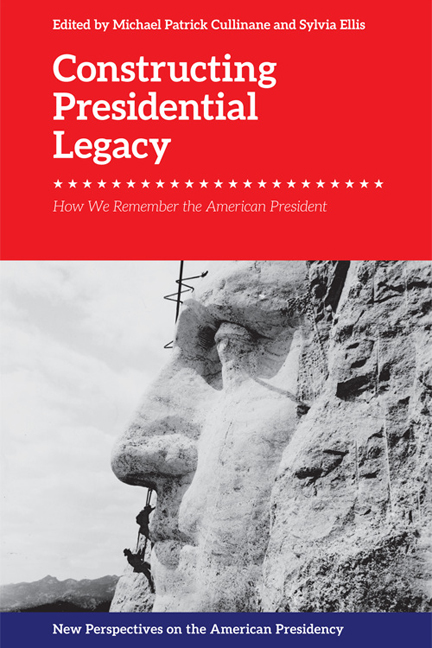Book contents
- Frontmatter
- Contents
- Acknowledgments
- Notes on Contributors
- An introduction to Presidential Legacy
- 1 Presidential Temples: America’s Presidential Libraries and Centers from the 1930s to Today
- 2 Presidential Legacy: A Literary Problem
- 3 Pennsylvania Avenue meets Madison Avenue: The White House and Commercial Advertising
- 4 Eisenhower’s Farewell Address in History and Memory
- 5 Pageantry, Performance, and Statecraft: Diplomacy and the Presidential Image
- 6 “You’ve got to decide how you want history to remember you”: The legacy of Lyndon B. Johnson in film and Television
- 7 The Farewell Tour: Presidential Travel and Legacy Building
- 8 Reflecting or Reshaping?: Landmark Anniversaries and Presidential Legacy
- 9 From a “New Paradigm” to “Memorial Sprawl”: The Dwight D. Eisenhower Presidential Memorial
- 10 Top Trumps: Presidential Legacies, New Technologies, and a New Generation
- Epilogue: Confessions of a Presidential Biographer
- Index
7 - The Farewell Tour: Presidential Travel and Legacy Building
Published online by Cambridge University Press: 01 May 2021
- Frontmatter
- Contents
- Acknowledgments
- Notes on Contributors
- An introduction to Presidential Legacy
- 1 Presidential Temples: America’s Presidential Libraries and Centers from the 1930s to Today
- 2 Presidential Legacy: A Literary Problem
- 3 Pennsylvania Avenue meets Madison Avenue: The White House and Commercial Advertising
- 4 Eisenhower’s Farewell Address in History and Memory
- 5 Pageantry, Performance, and Statecraft: Diplomacy and the Presidential Image
- 6 “You’ve got to decide how you want history to remember you”: The legacy of Lyndon B. Johnson in film and Television
- 7 The Farewell Tour: Presidential Travel and Legacy Building
- 8 Reflecting or Reshaping?: Landmark Anniversaries and Presidential Legacy
- 9 From a “New Paradigm” to “Memorial Sprawl”: The Dwight D. Eisenhower Presidential Memorial
- 10 Top Trumps: Presidential Legacies, New Technologies, and a New Generation
- Epilogue: Confessions of a Presidential Biographer
- Index
Summary
In March 2016, President Barack Obama made a historic trip to Cuba, the first time in nearly ninety years that an American president had set foot on its soil. The visit reflected Obama's efforts to set a “new course” in US relations with this neighboring island state. But his presence there received as much criticism as it did praise. Writing in the Washington Post, conservative columnist Charles Krauthammer denounced Obama's decision to travel to a country known for its repressive communist regime. Moreover, the visit revealed Obama's skewed sense of priorities, Krauthammer said, elevating Cuba's diplomatic status (and Obama's concern with the US prison at Guantanamo Bay) over more pressing international issues. Warming to this theme, Krauthammer observed that the president “could not bestir himself to go to Paris in response to the various jihadi atrocities” of 2015, but he could rouse himself to “make an ostentatious three-day visit there for climate change”—referencing the United Nations agreement Obama helped negotiate. Thus Obama's trips provided a window into the issues he really cared about, Krauthammer said: “climate change, Gitmo and Cuba.” And more than that, at this late stage in his presidency, what he hoped to be known for. “With time running out, he wants these to be his legacy.”
This chapter examines that claim: the extent to which presidents use travel, both domestic and international, to emphasize their political priorities and the issues or achievements for which they hope to be remembered. It considers, in essence, to what extent a president's itinerary late in their administration offers insight into their desired legacy. To assess this possibility in its likeliest cases, the chapter only looks at presidents who know their administration is coming to an end: those elected to a second term since ratification of the Twenty-second Amendment in 1951, which limits the president to two full terms in office. For comparability, it considers only those presidents who completed two full terms: Dwight D. Eisenhower, Ronald Reagan, Bill Clinton, George W. Bush, and Barack Obama, assessing how their public activities might shape their entries in the history books.
- Type
- Chapter
- Information
- Constructing Presidential LegacyHow we Remember the American President, pp. 158 - 205Publisher: Edinburgh University PressPrint publication year: 2018



